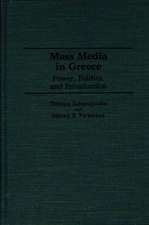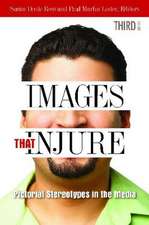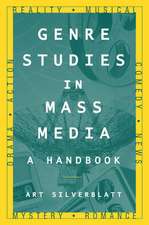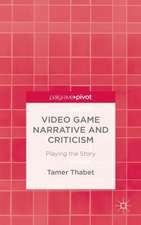The War in Iraq and Why the Media Failed Us
Autor David Dadgeen Limba Engleză Hardback – 29 iul 2006 – vârsta până la 17 ani
Preț: 307.77 lei
Preț vechi: 374.99 lei
-18% Nou
Puncte Express: 462
Preț estimativ în valută:
58.90€ • 61.26$ • 48.62£
58.90€ • 61.26$ • 48.62£
Carte tipărită la comandă
Livrare economică 15-29 aprilie
Preluare comenzi: 021 569.72.76
Specificații
ISBN-13: 9780275987664
ISBN-10: 0275987663
Pagini: 216
Dimensiuni: 156 x 235 x 23 mm
Greutate: 0.49 kg
Editura: Bloomsbury Publishing
Colecția Praeger
Locul publicării:New York, United States
ISBN-10: 0275987663
Pagini: 216
Dimensiuni: 156 x 235 x 23 mm
Greutate: 0.49 kg
Editura: Bloomsbury Publishing
Colecția Praeger
Locul publicării:New York, United States
Notă biografică
David Dadge is Editor of the International Press Institute in Vienna and author of Casualty of War: The Bush Administration's Assault on a Free Press (2004).
Cuprins
The Road to AweWhen President Bites WatchdogThe Arm's Length PrincipleAll Quiet on the Home FrontThe Prison, the General and the Flexible BroadcasterConcentrating on BiasMea PulpaReintroducing the Skeptic's Test
Recenzii
Also author of Casualty of War: The Bush Administration's Assault on a Free Press (CH, Sep'02, 41-0601), Dadge (International Press Institute, Vienna) here faults US media for failure to report the facts of the Iraq war. Supporting his argument with an imposing array of data, the author cites as mitigating reasons for this inept performance jingoistic patriotism, self-censorship, subtle pressures from the Bush administration, and an inability to confirm intelligence information. The bottom line: the Fourth Estate failed in its fundamental role to inform the American people fully and fairly of the facts of the nation's venture into invasion and war. Dadge points out that the press has been derelict before--in the Spanish-American War, WW I, and Korea--but he argues that never before has an administration managed to control news on such a scale. The efforts of the Bush ideologues were abetted by the press itself, which was muted by self-inflicted credibility problems and timidity to voice dissent and criticism. The author's prescription for improvement: the media must adopt a new skepticism for government and return to journalism's basic tenets, independence and accountability. Otherwise, a growing public apathy will further erode First Amendment rights in the US. Highly recommended. Upper-division undergraduates and above.
It is perhaps a truism to note that the Bush administration's greatest domestic ally in his effort to invade Iraq was the US media, which consistently failed to question even the most outrageous and, often, demonstrably false assertions and insinuations about the danger posed by Saddam Hussein coming from administration figures and their congressional supporters. In addition to documenting this miserable performance, Dadge explores some of the explanations for the media's behavior, including media corporate consolidation, government pressure, and patriotic self-censorship stemming from the 9-11 attacks. In the end, he somewhat surprisingly concludes that the media is capable of reforming itself, so long as it develops a new skepticism towards government and supports editorial independence.
It is perhaps a truism to note that the Bush administration's greatest domestic ally in his effort to invade Iraq was the US media, which consistently failed to question even the most outrageous and, often, demonstrably false assertions and insinuations about the danger posed by Saddam Hussein coming from administration figures and their congressional supporters. In addition to documenting this miserable performance, Dadge explores some of the explanations for the media's behavior, including media corporate consolidation, government pressure, and patriotic self-censorship stemming from the 9-11 attacks. In the end, he somewhat surprisingly concludes that the media is capable of reforming itself, so long as it develops a new skepticism towards government and supports editorial independence.

















